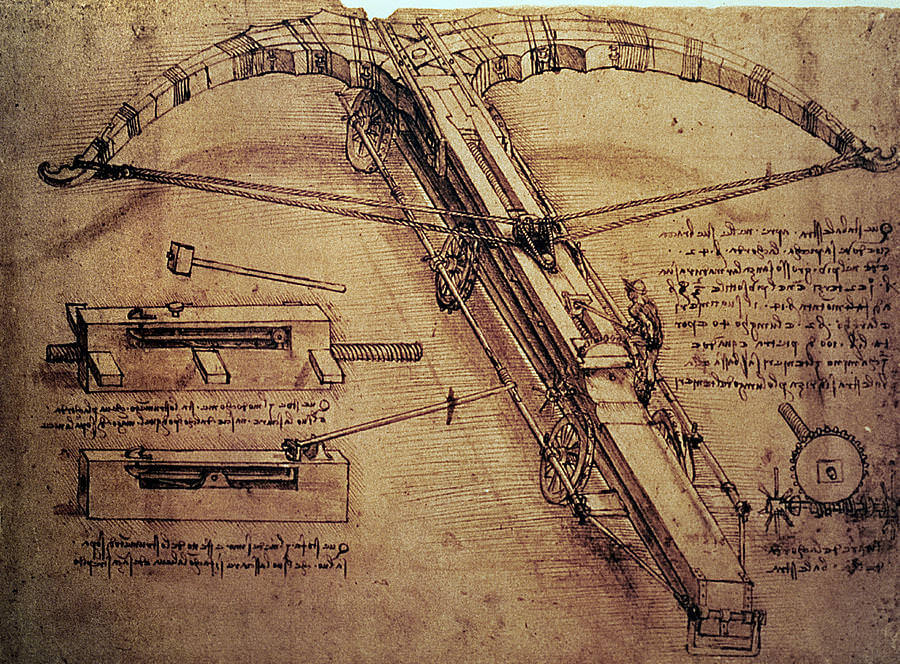Science has been associating with war for a long. In the ancient age, the inventors like Archimedes and Leonardo turned their research for figuring out some of the significant problems of the fight of that historical period.
Archimedes had made use of his mathematical knowledge and designed a Catapult to launch rocks, timbers, and other heavy objects over the great distance between the city walls and moored enemy ships. His war machines played a vital role in the Roman army’s defeat when they attacked Syracuse, the hometown of Archimedes. Leonardo Da Vinci had also designed a giant crossbow, a tank, a steam-powered cannon, and deviously created horse-powered carts and weapon diagrams.
The first and second world wars greatly accelerated the process of incorporation of science into warfare. A rough estimate shows that somewhere between a quarter and half of scientists and engineers worldwide were engaged in military projects. Due to the high fraction of war-oriented science funding, many research areas and applications of modern science were produced for the war.
An example is climatology, since the weather condition and predictions affected military operations, especially in airstrikes. Several military-funded research projects were initiated in the 19th century to study weather modification.
The war influenced not only the specific scientific research projects but also the whole direction of technological evolution. During the first several centuries of modern science, technological advancement usually revolves around the scientific explanation.
It is very likely that the research breakthroughs will soon transform the technological battlefield. The most destructive period of history tends to be those when means of aggression have earned the upper hand in the art of waging war.”
Nuclear physics is a prime example of this interaction. The considerable interest of researchers in atomic science is due to the urge to make a devastating weapon against the enemy. When several governments launched nuclear power projects, they provided colossal funding and available resources for expanding training and research work in nuclear science.
Another era of technological innovation that is significantly influenced by military imperatives is computer science. During the 40’s and afterward, the military interest was primarily in mainframe computers to crunch numbers for solving problems related to nuclear weapon designs and forming more efficient nuclear-war strategies.
In the modern era, science and technology extended to robotics, artificial intelligence, biotechnology, synthetic biology, neurosciences, Nanotechnology, 3D printing, data sciences, and the interaction of each of them, ‘cyber security’.
The concept and underlying strategic importance were articulated at the multinational level in NATO’s May 2010 new strategic concept paper. This paper concluded that “it is very likely that the research breakthroughs will soon transform the technological battlefield. The most destructive period of history tends to be those when means of aggression have earned the upper hand in the art of waging war.”
Moreover, the emerging trends of using new technologies for war strategies have underlined a couple of unresolved security puzzles that have implications for international security, defense policies, deterrence, governance, and arms control.
Summing up all these issues, Scientia Pakistan brings its special edition on “Defense technology”, on the eve of Pakistan’s Defense Day. The real feast of this edition is the interview of Dr. Tariq Mustafa, a senior space scientist from Pakistan. He briefly speaks on Pakistan’s contribution to NASA’s Apollo series and the launch of Pakistan’s first rocket, ‘Rehbar-1’in 1962. With this launch, Pakistan assembled essential data for the climate study over the Arabian sea.
Other lead stories are joint all-domain warfare, bioterrorism and its role in the conspiracy creation during the pandemics, national security and climate change, impacts of wars on wildlife, cybersecurity, future of security in space, environmental defense, and much more.
So gear up, tighten your belts, and start your journey to a beautiful read. Have a lovely week ahead.

Saadeqa Khan is the founder, CEO, & Editor-in-Chief of Scientia Pakistan. She’s a member of the Oxford Climate Journalism Network (Second Cohort) and NASW. Saadeqa is a fellow of NPF Washington, The Falling Walls Foundation, and the Science Journalism Forum. Saadeqa has won several international journalism grants and awards for her reports.

